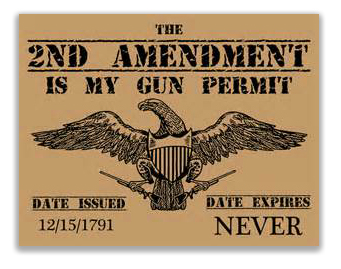We post news and comment on federal criminal justice issues, focused primarily on trial and post-conviction matters, legislative initiatives, and sentencing issues.

RUMBLINGS OF 922(g) UNCONSTITUTIONALITY
 Even while the Supreme Court ponders Rahimi – the case that questions whether prohibiting people subject to domestic protection orders from having guns – lower courts are expressing doubts about whether 18 USC § 922(g), the statute prohibiting felons from possessing firearms, remains constitutional after the Supreme Court’s 2022 New York State Rifle & Pistol Assn v. Bruen decision.
Even while the Supreme Court ponders Rahimi – the case that questions whether prohibiting people subject to domestic protection orders from having guns – lower courts are expressing doubts about whether 18 USC § 922(g), the statute prohibiting felons from possessing firearms, remains constitutional after the Supreme Court’s 2022 New York State Rifle & Pistol Assn v. Bruen decision.
The leading decision against unconstitutionality, of course, is Range v. Atty General, a 3rd Circuit en banc decision last June. Range held that § 922(g)(1) was unconstitutional as applied to Bryan Range, who had been convicted of a welfare fraud offense 25 years ago. The government has filed for Supreme Court review in Range and asked SCOTUS to sit on the petition until it decides Rahimi next spring.
At the same time, the 8th Circuit went the other way in United States v. Jackson.
Down in the trenches, however, two federal district courts have held in the last several weeks that the felon-in-possession statute is unconstitutional.
In Chicago, Glen Prince – who the Government said had been robbing people at gunpoint on commuter trains – was arrested late one night while standing on a train platform with a gun. Ten days ago, a district court threw out his pending 18 USC § 922(g)(1) indictment – which alleged that Glen was Armed Career Criminal Act-eligible – as unconstitutional under Bruen.
The court ruled that Bruen did not hold that the Second Amendment categorically protects only law-abiding citizens, despite repeated use of such qualified language as “law-abiding citizens” in the decision. The district judge concluded instead that “the government has not met its burden to prove that felons are excluded from ‘the people’ whose firearm possession is presumptively protected by the plain text of the Second Amendment.
 Because the right of a person with a prior felony conviction to possess a gun is presumptively protected by that Amendment, the court said, Bruen gives the government the authority to prohibit possession only when it can “demonstrate that the statute is part of this nation’s historical tradition of firearm regulation… Where a ‘distinctly modern’ regulation is at issue, the government must offer a historical regulation that is ‘relevantly similar’ and… must determine whether historical regulations ‘impose a comparable burden on the right of armed self-defense and whether that burden is comparably justified’ as the burden imposed by § 922(g)(1).”
Because the right of a person with a prior felony conviction to possess a gun is presumptively protected by that Amendment, the court said, Bruen gives the government the authority to prohibit possession only when it can “demonstrate that the statute is part of this nation’s historical tradition of firearm regulation… Where a ‘distinctly modern’ regulation is at issue, the government must offer a historical regulation that is ‘relevantly similar’ and… must determine whether historical regulations ‘impose a comparable burden on the right of armed self-defense and whether that burden is comparably justified’ as the burden imposed by § 922(g)(1).”
The “first federal statute disqualifying certain violent felons from firearm possession was not enacted until… 1938,” the court noted, finding “no evidence of any law categorically restricting individuals with felony convictions from possessing firearms at the time of the Founding or ratification of the Second or 14th Amendments.” The district court concluded that § 922(g)(1) “imposes a far greater burden on the right to keep and bear arms than the historical categorical exclusions from the people’s Second Amendment right. The government has not demonstrated why the modern ubiquity of gun violence, and the heightened lethality of today’s firearm technology compared to the Founding, justify a different result.”
Glen’s ACCA count was dismissed.
Meanwhile, in the Eastern District of Pennsylvania, a district court declared § 922(g) unconstitutional as applied to a man convicted of a DUI two decades ago.
Ed Williams had a prior drunk-driving conviction when he was arrested for DUI in Philadelphia 20 years ago. The prior conviction, combined with the fact that his blood alcohol concentration was three times the legal limit, made the second offense “a 1st-degree misdemeanor punishable by up to 5 years in prison.” That was enough to trigger § 922(g)(1), which prohibits guns to anyone convicted of a crime carrying a maximum sentence of over a year in prison (not just felonies).
 The district court ruled that “[p]rohibiting [Ed]’s possession of a firearm due to his DUI conviction is a violation of his Second Amendment rights as it is inconsistent with the United States’ tradition of firearms regulation. The Constitution ‘presumptively protects’ individual conduct plainly covered by the text of the Second Amendment, which includes an individual’s right to keep and bear arms for self-defense… Protected individuals presumptively include all Americans… The Supreme Court has held that an individual’s conduct may fall outside of Second Amendment protection ‘[o]nly if a firearm regulation is consistent with this Nation’s historical tradition…’”
The district court ruled that “[p]rohibiting [Ed]’s possession of a firearm due to his DUI conviction is a violation of his Second Amendment rights as it is inconsistent with the United States’ tradition of firearms regulation. The Constitution ‘presumptively protects’ individual conduct plainly covered by the text of the Second Amendment, which includes an individual’s right to keep and bear arms for self-defense… Protected individuals presumptively include all Americans… The Supreme Court has held that an individual’s conduct may fall outside of Second Amendment protection ‘[o]nly if a firearm regulation is consistent with this Nation’s historical tradition…’”
The district court relied on the fact that the 3rd Circuit had “determined that Bryan Range, who had a qualifying conviction under Section 922(g)(1) for making a false statement to obtain food stamps and who wished to possess firearms to hunt and to defend himself, could not be denied his 2nd Amendment right to possess a firearm due to that conviction.” The judge held that “the narrow analysis in Range also applies to the Plaintiff here.”
United States v. Prince, Case No. 22-CR-240, 2023 U.S. Dist. LEXIS 196874 (N.D. Ill., November 2, 2023)
Williams v. Garland, Case No. 17-cv-2641, 2023 U.S. Dist. LEXIS 203304 (E.D.Pa., November 14, 2023)
WLS-TV, Chicago judge rules statute barring felons from having guns unconstitutional under Bruen decision (November 16, 2023)
Reason, He Lost His Gun Rights Because of a Misdemeanor DUI Conviction. That Was Unconstitutional, a Judge Says (November 15, 2023)
– Thomas L. Root

